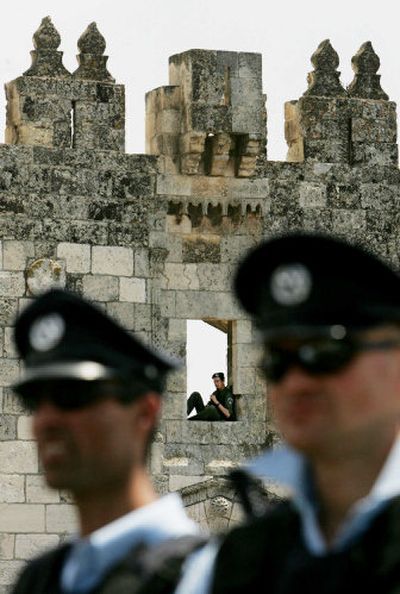Thousands mourn slain Arab-Israelis

SHFARAM, Israel – Thousands joined funeral processions Friday for four residents of this Arab-Israeli town killed by a Jewish soldier opposed to the Gaza Strip pullout, and Prime Minister Ariel Sharon sought to calm the nation’s angry Arab minority.
Israeli officials struggled to determine how they failed to prevent the attack by 19-year-old Eden Natan-Zada, who recently deserted the army with his weapon to protest the Gaza withdrawal and had been identified as a security threat.
Sharon condemned the attack as “a despicable act by a bloodthirsty terrorist,” and Israeli newspapers referred to the shooting as an act of terrorism – language usually reserved for Palestinian suicide bombers.
The prime minister spent the day on the phone with community leaders and Israeli Arab lawmakers “expressing his sheer outrage and shock and sending his condolences to the families of those killed and wounded,” said David Baker, an official in Sharon’s office.
Natan-Zada’s body was held in a morgue as officials tried to determine where to bury him. Jewish law requires swift burial.
Defense Minister Shaul Mofaz refused to grant Natan-Zada a military funeral, and officials in his hometown of Rishon Lezion and the West Bank settlement where he recently lived refused to accept the body.
Yitzhak Natan-Zada, the soldier’s father, appeared on Israeli TV at the morgue demanding release of the body so that it could be buried according to Jewish law, but he was refused.
For months, Israeli security has warned that extremists might try to sabotage the mid-August pullout from Gaza and four small northern West Bank settlements by attacking Arabs in a bid to raise tensions and divert forces carrying out the withdrawal.
Eden Natan-Zada, who had recently moved to a hard-line Jewish settlement in the West Bank, boarded a bus Thursday bound for Shfaram, a town of 35,000 Muslims, Christians and Druse Arabs.
The soldier, who was wearing the skullcap, beard and sidelocks of an ultra-Orthodox Jew, opened fire on the driver when the bus entered Shfaram, then proceeded to kill three other passengers before he was subdued and beaten to death by an angry crowd. More than a dozen people were wounded.
The shooting enraged Israel’s Arab minority, which enjoys citizenship but has long suffered from poverty, unemployment and discrimination.
Thousands of police were deployed in northern Israel and in Jerusalem in anticipation of possible rioting. But prayers at the Al-Aqsa mosque in Jerusalem and the funeral processions in Shfaram proceeded without incident, though Hamas militants in Gaza threatened retaliation.
Authorities struggled to determine how Natan-Zada managed to carry out the attack, despite their knowledge that he had deserted the army with his weapon.
Natan-Zada’s father told the Associated Press he had asked the army to find his son, saying he was concerned his son’s weapons would fall into the hands of fanatics in Tapuah.